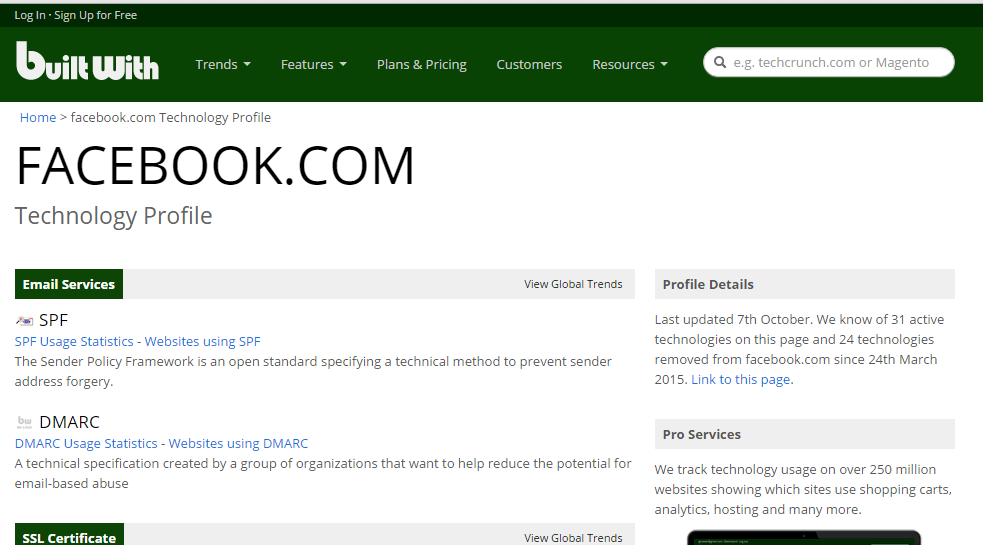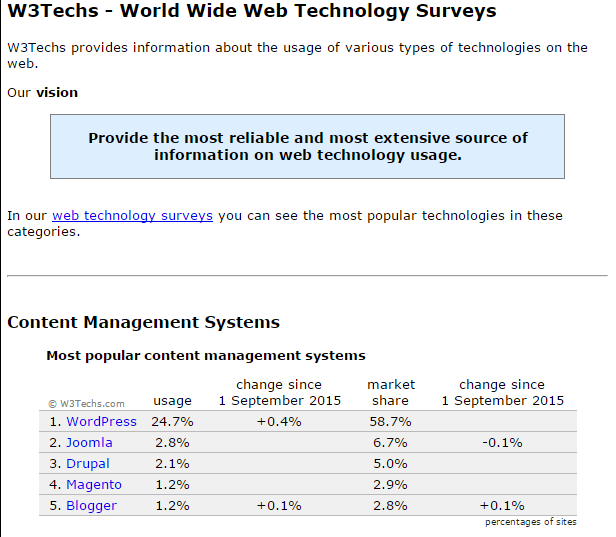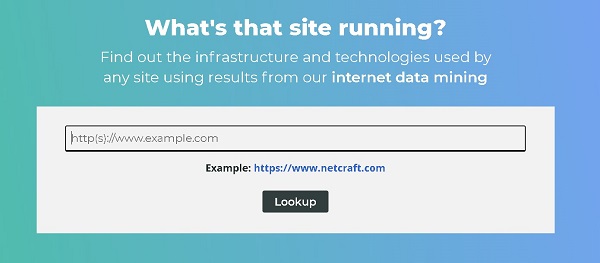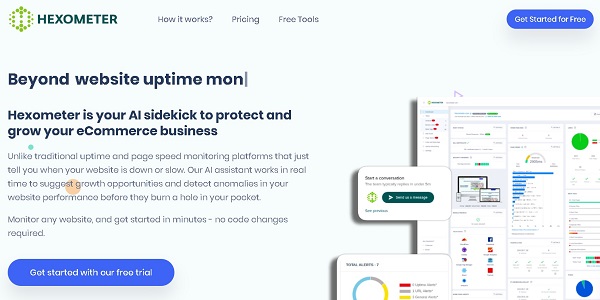Have you ever wondered what technologies Facebook is using in order to give users, best social networking experience or what are the services that YouTube utilizes behind the scene that gives you a seamless video streaming experience? Well, this information is not publicly available; however, there are web services available that can detect the technologies and services being used by a website. This article presents a brief overview of such websites.
Builtwith.com is the best website that provides technical insight into other websites. It has a simple landing page where the user enters the name of the website and all the technological details of the website are displayed to the user.

SimilarTech is another website that contains detailed information about technologies that are currently being used by different websites. Apart from containing information about individual websites, SimilarTech also provides overall statistics about a certain technology. For instance, the landing page of SimilarTech contains information that PayPal is being used by 905526 companies.

W3tech.com contains detailed statistics of most of the famous technologies being used by websites. The site contains information about the fastest-growing content management systems, fastest-growing server, and client-side programming languages; server and client-side development frameworks, etc. The site contains precious information for those who are in the first phase of software development and are confused about the technologies they should use.

Like builtwith.com and similartech.com, datanyze.com contains information about all of the latest technologies being used by different websites. Datanyze.com contains data regarding technologies used by individual websites as well as overall technology statistics.

Wappalyzer is another top service that gives you details on what technologies a website is using.
This browser extension is available for download for Chrome, Edge, and Firefox. Once installed, the extension works locally and will provide data on the tech behind websites. Find out what technologies are running a site- it’s free and offers instant lookups.
Use Wappalyzer to uncover tech stacks in content management systems, e-commerce, and advertising networks among others. The tool tracks thousands of technologies and offers valuable insights ideal for market research and analysis of competing websites.

Netcraft.com offers a tool for anyone to get site reports. The tech has been around for a while and continues to prove invaluable to those out to determine what runs behind websites.
Use the Netcraft Site Report tool to do site background checks.
Here the tool returns data on ranking, language, domain, network owner, and website host country. Find out which site technologies are used on any website, be it CDN, CMS, or RSS? It is a great tool to access SSL cert details and assess site vulnerability.
The browser extension offers protection against phishing and users can use its service to report malicious URLs.

Rescan.io allows anyone to identify what technologies companies use on their websites. The monitoring tool (formerly Allora) scans millions of websites in over 1500 domain zones.
You can use Rescan.io to check any website and see what tech runs their message boards, operating systems, Webmail, and Analytics among many others.
For example, a check will reveal what websites use Shopify, WordPress, or Magento. This website analysis tool is available for free and will return site technologies on e-commerce, advertising, and analytics. Updated daily, you are sure to get all the information and data hidden from the naked eye.

Snov.io is another monitoring tool to check out if you want to discover or check what web technologies the websites you visit or apps you use run.
The browser extension offers a Technology Сhecker for Chrome and accurately detects tech behind any website or app. Find out about CMS, site marketing tools, payment engines, and e-commerce platforms. To find the extension, go to Chrome Web Store and click to add. Visit any website you are interested in looking up and see what technologies it uses. You can also type in a given technology name and search. Export search results by choosing a CSV file.

As the name suggests, Whatruns.com allows you to check and find out what runs any website you come across. This free browser extension is easy to use and offers results at the click of a button.
Use Whatruns.com to literally go behind any website to discover the technologies that power it. The extension will check the website and tell you what web apps the firm behind the site pays for, or how the website tracks visitors.
Discover what CDN the website is hosted on or simply see installed WordPress plugins. The tool also lets you track the website to know when they have new technology or stop using one.

Like the other website checker tools, Hexometer offers a Technology Stack Checker that tells what tech or services a website uses.
Use the service to detect over 60 different types of technologies used on a website.
Find about CMS, databases, frameworks, and coding languages. Check out the site or app to determine what e-commerce solutions are installed or what marketing tools the website uses.

You can use a Content Management System or CMS to create and edit a website. However, a CMS can help you do more than a simple website with traditional content. For instance, you can use it to create a community platform, where users can upload and share content. You can also use a CMS to create an online store, or even a web application.
With that in mind, if you just saw a website and you are wondering how they did it, you can start by finding out if they used a CMS. WhatCMS.org is a great resource for detecting a website’s CMS. It can detect the most common CMSs, such as WordPress, Squarespace, WooCommerce, among others.
Another popular platform for detecting a CMS or framework used to build a website is CMSDetect.com. It scans the website’s HTML code for markers and codes used to identify the CMS or framework used for that website.
Sometimes a website may use multiple CMS or frameworks to achieve multiple functions. To do that, they may use one CMS for the primary domain, and then use another framework or CMS to build a specialized subdomain, such as an online store.
CMSDetect.com can scan a domain’s known URLs, to find out that information for you. It supports detection of hundreds of website platforms, which makes it a great tool for website technology detection.
It’s often good to know which OS a website is running on, and also check whether it is the latest version. Using the latest version of the OS can help to secure a website against attacks. Using DNSChecker.org’s Website OS tool, you can easily check a website’s OS version, and update it if necessary.
However, DNSChecker.org server software can only detect the website’s public information, as viewed when you access it through its public IP address. If the website is served through front-end cloud proxy services such as Sucuri or Cloudflare, then you will only be able to see that proxy service’s OS.
WordPress is among the most popular website creation platforms. And it can be used by experienced developers and newbies to launch simple or sophisticated websites.
Often users may see a website and wonder whether they can use WordPress to create a similar website. That’s where IsItWP comes in.
Users can use this service to find out whether a website is built using the WordPress platform. They can then go ahead and have a developer design their site using a similar design.
While this may not be the best way to go about it, it’s a good way to determine if WordPress if could be the right solution for your site.
Another tool you can use to check a website’s software and the web server is IPLocation.io’s Check Website Web Server Tool. Knowing what software a website is running on is important for security reasons, as well as SEO reasons. You can use that information to secure and optimize your website accordingly.
Apart from the website’s software and web server information, you can use iplocation.io to view the website’s age and geographic location of its public IP. This information can be useful if you are buying a business website.
Which other tool or extension do you use to peak at what technologies run websites? Share in the comments section.